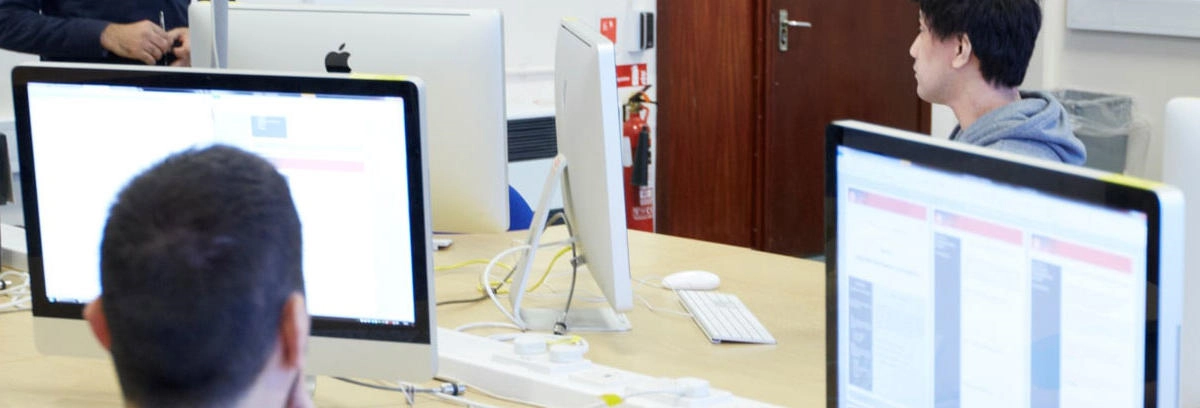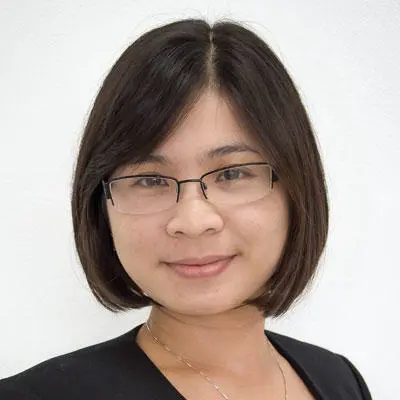MScComputer Engineering
Apply direct
- 1 year full-time
- 1 year full-time with placement
Why study a computer engineering master's degree at Solent University
Bring your problem-solving skills to both existing and emerging technologies on this highly practical, industry-led conversion course, ideal for students from non-computing backgrounds.
- £0minvested in our campus estate and facilities in the last five years
- 0thUK uni for sustained employment (Longitudinal Educational Outcomes, 2022)
- You'll get the chance to take part in industry talks, code jams and live projects. Solent also hosts regular British Computer Society (BCS) professional development events.
- You'll have full access to the University's high-spec networking labs, equipped with industry-standard networking equipment from Cisco, Fluke and HP, as well as high-fidelity simulation systems, including the marketing-leading Opnet.
- You'll use Alienware computers and have access to our device laboratory to test your applications.
- Applicants from all academic disciplines can apply. This conversion course means you can apply even if you haven't studied in this subject area before. Add to your skills, diversify your knowledge, expand your experience, and learn something new.
- Continue your studies with a research degree. This course will equip you with research and academic skills, helping you to pursue a PhD or an academic career.
- Benefit from free computing career consultation for life. Our careers advice service, Solent Futures is available to all Solent students and graduates for life, helping you to progress in your current career or discuss options for a change in career.
- This course is eligible for the Postgraduate Master's student loan. The loan is from Student Finance England and can be used to cover costs (ie, accommodation, tuition fees) associated with postgraduate studies (it was up to £12,167 for 2023 entry).
Course overview
Solent’s computer engineering postgraduate conversion degree is well-suited to students from non-computing backgrounds, helping you to learn new skills and develop advanced theoretical and practical proficiencies for a range of computing careers.
This computer engineering master’s conversion degree exposes students to a wide range of both existing and emerging technologies and covers areas such as coding, software development, problem solving, computing, digital technologies and engineering.
Working with the latest technology, students on this course will also have the opportunity to learn to program robotic devices and can learn to develop apps for Android devices. To test these apps, students have access to the University’s device laboratory which is a special test area consisting of a range of mobile devices, allowing students to assess their website designs and apps on real equipment.
The course curriculum is developed with input from a variety of sources, including an industrial liaison panel, to ensure students are studying the latest technology and working practices employed by industry experts.
With a strong focus on employability, and to complement studies, this course offers students the opportunity to work on live briefs, events and projects with real-world companies. Regular industry speakers and events by the BCS can help students to build their professional network.
Any questions?
Contact international admissions
Email: admissions.international@solent.ac.ukCall: +44 (0)23 8201 5066Speak to a tutor
Speak to a tutorCourse features
Specialist facilities
This course has access to specialist facilities
Apply direct
You can apply direct to Solent University for this course
Further studies
After successfully completing your studies, there's an opportunity to continue your studies at Solent
This course is for
This conversion master’s course is ideally suited to students from a number of academic backgrounds who have a strong interest in problem-solving and existing/emerging technologies.
The course is also suited to those with extensive industry experience in this area who wish to gain an academic qualification.
What this course leads to
Demand for well-qualified information technology graduates remains strong.
- IT project management
- Software development
- Web and mobile development
- Software architecture
- Project management
Meet the team
The University cannot guarantee any particular members of staff will teach specific aspects of the course in the future, but will endeavour to ensure the teaching team maintains their balance of experience and qualifications.
Year one
Core modules
Research Methods (15)
This module will initially introduce the student to core methodological approaches. It will then examine a range of specific research methods, which are essential to underpin good research, as well as exploring some of the tools which are used in the processing and analysis of datasets.
Professional Issues and Practice (15)
The module will look at standards of practice, not as a set of static documents but as a dynamic set of potential achievements, as for example envisaged by TickITplus and CMMI.
Computer Fundamentals (15)
This module introduces students to computer fundamentals and related concepts.
Cyber Security Application (15)
This module provides students with a practical introduction to cyber security.
Software Design and Development (15)
This module will give students with no prior OO experience sufficient understanding of OO development to undertake a small-scale OO software development project.
Networking (15)
This is an introduction to networks and is designed to develop the skills necessary to plan and implement small networks across a range of applications. By the end of the module, students will be able to build simple LANs, perform basic configurations for routers and switches, and implement IP addressing schemes.
Databases (15)
In this module students are introduced to the skills and concepts required for developing relational SQL-based database application solutions and will apply them by using web-based, enterprise-level database software tools.
Web Technologies (15)
This module gives graduates from non-computing backgrounds a thorough grounding in web development.
Dissertation (60)
The content of your dissertation should reflect your passions and interests within your field of study, and must be drawn from relevant theory, supported by the practical aspects of your degree. Projects may be practical or investigative in nature, but all projects must produce specific artefacts that demonstrate your intellectual and practical skills in the subject area.
Learning resources
At Solent, our aim is to deliver innovative, inclusive and intellectually stimulating teaching to develop self-confident and highly employable graduates. All our courses are designed with employability in mind, which makes industry-based learning a priority.
Learn transferable skills
You will be supported to develop a range of transferable skills throughout the course. This includes programming, project management, problem-solving, analytical skills, technical writing, teamwork, communication and presentation skills.
These transferable skills empower you to work in a range of different industries after graduation. The course will also equip you with research and academic skills helping those who wish to pursue a PhD or an academic career.
Facilities
We have up-to-date IT laboratories and a usability lab with eye-tracking facilities, used to test and refine interfaces. Students also have the opportunity to learn to program robotic devices, and can develop apps for android devices. You will also have access to modern computer labs set up for various programming languages and using the latest design and development software, including Adobe Creative Cloud and GNS3.
We also have specialist networking labs with a wide variety of real-world networking equipment from Cisco, Fluke and HP, plus high-fidelity simulation systems, including the market-leading Opnet. You’ll use Alienware computers, and test your applications in our new device laboratory. This is a special test area integrated within one of our existing software development spaces. It consists of a range of mobile devices mounted on flexible tethers. This arrangement allows you to test your website designs and apps on real equipment, ensuring they perform as expected on the target platforms.
Alumni network
As part of our global alumni community, you can take advantage of a range of benefits.
Whether it's been days or decades since you left us, or you're soon to don your cap and gown, things are constantly changing at Solent. We're always innovating, but we're also immensely proud of our heritage. And that means you.
Research and knowledge exchange
Research doesn't just live in publications and journals - the effects of groundbreaking research can be found everywhere you look. That's why research at Solent has always been firmly rooted in industry needs and real-world application.
Solent University prides itself on carrying out not only pioneering research, but also research that addresses real world problems. We offer opportunities to study for a Master of Philosophy (MPhil) or Doctor of Philosophy (PhD) degree in a number of areas.
At Solent, we want to help you achieve your best and discover new insights. Whether you're thinking about applying for a PhD, or already underway with your research studies, you'll find useful guidance and information in our research pages.
Find out moreSupport at Solent
All students at Solent University have access to a range of specialist support services. Whether you are having financial difficulty, need additional help with academic skills or want advice on setting up your own business you'll find that help is always on hand.
Most of our specialist support services are based around the Student Hub, a central space where you can access all of the information and support you may need during your time at University. The Student Hub is the first point of contact if you have any queries relating to your course, including questions about your timetable, options, and assessments and extenuating circumstances.

We work in partnership with the University to build a sense of pride and confidence in your Union, University and student experience.
Find out moreTuition fees
The tuition fees for the 2024/25 academic year are:
- UK and Channel Island full-time fees: £9,675 per year
- International full-time fees: £17,065 per year
For further information, please visit our tuition fees page.
Extra course costs
While most course costs are covered by your tuition fees, some essential resources and optional extras may need to be paid for separately. For advice on budgeting and managing your money, please contact student.funding@solent.ac.uk.
Alumni discount
Solent alumni are eligible for a 20% reduction of tuition fees if returning to study a postgraduate course.
Find out moreBursaries, scholarships and financial support
Solent University offers a range of bursaries and scholarships that provide financial assistance or waive fees for tuition or accommodation. Each bursary or scholarship has specific eligibility criteria. Check out our bursaries and scholarships pages to find out more.
Cost of living support
At Solent, we understand that the cost of living crisis may be of some concern. To help, we've put together some detailed information to show what support is available and how to make your money go further.
Graduation costs
There is no charge to attend graduation, but you will be required to pay for the rental of your academic gown (approximately £45 per graduate, depending on your award). You may also wish to purchase official photography packages, which range in price from £15 to £200+. Graduation is not compulsory, so if you prefer to have your award sent to you, there is no cost. Extra guest tickets will go on sale after results publication and will be sold on a first-come-first-served basis. The cost per ticket is currently £15. Please note, we do not guarantee there will be any extra tickets available to purchase.
Student finance videos
Discover Solent University Video transcript, with a description of visuals available.Find out what Southampton has to offer Video transcript, with a description of visuals available.
Entry requirements
Please select an option below:
Key entry requirements
Honours degree at 2:2 or higher in any discipline, or extensive industrial experience in this area.
- Applicants should be able to show an interest in learning to code.
- Qualifications equivalent to the above may also be considered – contact the University for further information.
- We also consider candidates with alternative qualifications and related professional experience.
Key entry requirements
If you are applying from outside the UK, find information about entry requirements, visas and agents for your country here.
For further information about UK, EU and international qualifications, please contact admissions.
Key entry requirements
If you are applying from outside the UK, find information about entry requirements, visas and agents for your country here.
For further information about UK, EU and international qualifications, please contact admissions.
Note to all international students requiring a visa
All international applicants need to be aware that the English language requirements to attend Solent University, and the English language requirements to obtain a visa from the Home Office, may be different. This means that if you meet the Solent University language requirement to gain a place on the course, you may still have to meet additional requirements to be granted with a visa by the Home Office.
We strongly advise all applicants to visit the Home Office website which outlines all the requirements for a successful visa application and to take a look at our 2023 course entry statement document.
An honours degree at2:2 or higher
Any questions?
Contact international admissions
Email: admissions.international@solent.ac.ukCall: +44 (0)23 8201 5066Speak to a tutor
Speak to a tutorYour application checklist
Applications for postgraduate courses can be made at any time prior to the start of the course. However, we strongly recommend you apply at your earliest convenience.
Please ensure you upload the following mandatory documents with your application:
- Two academic references.
- Certified transcripts of qualifications, including English language proficiency if non-UK student.
- Copy of passport.
- Copy of current visa (if applicable).
- A personal statement.
- Employer sponsor form, where appropriate.
Language requirements
Applicants who do not have English as their first language will be required to demonstrate an approved level of proficiency in the use of the English language. The agreed minimum requirements for this course are:
- IELTS minimum 6.0 overall with a minimum of 5.5 in each individual component
- TOEFL IBT 92 with a minimum of 22 in writing and a minimum of 20 in reading, listening and speaking
- Duolingo English Language Test - 115 overall with minimum of 100 in each component
or equivalent.
Qualifications are checked before enrolment, and international students must bring their original certificates or certified copies when coming to study at the University.
Pre-Sessional English programme
The University also offers a pre-sessional English programme for international students who wish to improve their level of English before starting a degree course.
Study options


Make your application
- 1 year full-time
- 1 year full-time with placement








